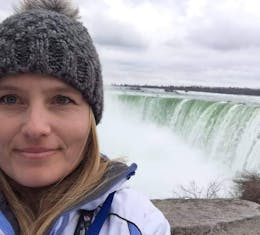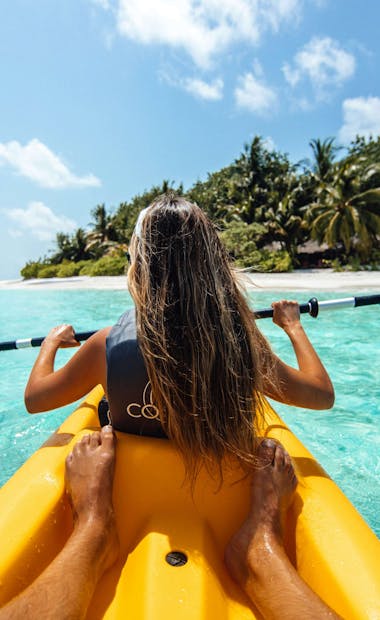New Zealand Tours
New Zealand Adventure Tours
Popular tours
 View Tour
View TourNew Zealand Explorer - 14 Days
- Auckland to Christchurch
- Age group: 18 - 39
- Max group size: 18
From£2,014 View Tour
View TourSouthern Voyager - 7 Days
- Christchurch to Christchurch
- Age group: 18 - 39
- Max group size: 18
From£998- Save11%
 View Tour
View TourBest of New Zealand: Mountain Biking & Black-Sand Beaches - 21 Days
- Auckland to Wellington
- Age group: 18 - 39
- Max group size: 20
Was:£2,779From£2,476 - Save26%
 View Tour
View TourNew Zealand – South Island Multisport - 15 Days
- Christchurch to Christchurch
- Age group: 12 - 100
- Max group size: 16
Was:£3,179From£2,360  View Tour
View TourSouthern Loop - 7 Days
- Christchurch to Christchurch
- Age group: 18 - 39
- Max group size: 18
From£976- Save26%
 View Tour
View TourNew Zealand: South Island Encompassed - 16 Days
- Wellington to Wellington
- Age group: 18 - 39
- Max group size: 20
Was:£2,229From£1,655
New Zealand Tours
Natural beauty is the biggest reason to visit this incredible destination, and until you have experienced it you will have no idea just how spectacular New Zealand is. The country is the adventurer’s dream with bungee jumping in Queenstown, white water rafting or even sky diving! You can trek the mountain peaks for weeks an entire month or experience unique glaciers. We are certain there are activities for every sort of traveller!
The beaches are pretty awesome too - you can (possible explore the many walking tracks through the native bush on North Island. We also recommend Milford Sound in the South Island, a stunning coastal area surrounded by mountains.
If you are especially interested in wildlife, we love the relatively undiscovered Stewart Island - head underground to watch thousands of glow worms illuminate the caves, or search for some of the largest Kiwis in the country on a nocturnal tour.
From beaches to volcanoes, and whether you want to go skiing in the mountains or whale watching while kayaking, New Zealand is truly an adventurer’s playground.
Please take a browse through our New Zealand Adventure Tours and Holidays and feel free to contact our expert team with any questions.
When is the best time to visit New Zealand?
The best time to visit New Zealand depends on your preferences and the activities you plan to engage in. New Zealand experiences mild temperatures and a varied climate throughout the year, so each season offers unique experiences. Here's an overview of the seasons to help you decide:
Summer (December to February): This is the peak tourist season in New Zealand. The weather is generally warm, with average temperatures ranging from 20-30°C (68-86°F) in most regions. It's an ideal time for outdoor activities like hiking, cycling, water sports, and exploring the stunning beaches and national parks. Accommodation and attractions can be busier, so it's advisable to book in advance.
Autumn (March to May): Autumn in New Zealand brings milder temperatures, ranging from 15-25°C (59-77°F). The landscapes transform into vibrant hues of red, orange, and gold, making it a picturesque time to visit. It's a great season for hiking, wine tours in regions like Marlborough and Central Otago, and enjoying scenic drives through the countryside.
Winter (June to August): Winter in New Zealand offers opportunities for snow sports enthusiasts. The South Island's ski fields, such as Queenstown and Wanaka, attract visitors from around the world. The North Island also has ski areas like Mount Ruapehu. Average temperatures range from 0-15°C (32-59°F) in most regions, but colder temperatures can be experienced in alpine areas. It's important to pack warm clothing and be prepared for occasional rainfall.
Spring (September to November): Spring brings mild temperatures ranging from 10-20°C (50-68°F) and blossoming landscapes. It's a beautiful time to witness the renewal of nature, with flowers blooming and wildlife becoming more active. Spring is ideal for hiking, wildlife spotting, and visiting gardens and parks. However, weather can be changeable, so it's recommended to pack layers.
It's important to note that New Zealand's weather can vary significantly between regions and even within a single day. Be prepared for all types of weather conditions regardless of the season. Popular tourist destinations can also be busier during school holidays and public holidays, so planning in advance is advisable.
Consider your preferred activities and the type of experience you desire when choosing the best time to visit New Zealand. Each season has its own charm, and the country's natural beauty will captivate you no matter when you go.
Will I need a visa to travel to New Zealand?
Whether you need a visa to travel to New Zealand depends on your nationality and the purpose and duration of your visit. Here are some general guidelines:
Visa-Free Countries: Citizens of certain countries, including many European Union countries, the United States, Canada, Australia, and the United Kingdom, do not require a visa for visits of up to 90 days as tourists. This is applicable for leisure, tourism, and short-term business activities.
Electronic Travel Authority (ETA): Travelers from visa waiver countries, including those mentioned above, are required to obtain an ETA before traveling to New Zealand. The ETA can be applied for online through the New Zealand Immigration website or using the official mobile app. The ETA is valid for multiple entries and allows a stay of up to 90 days within a 180-day period.
Visitor Visa: If you plan to stay in New Zealand for more than 90 days, work, study, or engage in other activities not permitted under the visa waiver or ETA, you will need to apply for a visitor visa. The specific type of visitor visa will depend on your circumstances and intended activities. The visitor visa can be applied for online through the New Zealand Immigration website.
Work and Study Visas: If you plan to work or study in New Zealand, you will need to apply for the appropriate visa before your trip. There are different visa categories available depending on the nature and duration of your work or study.
It's important to check the official website of Immigration New Zealand or consult with the New Zealand embassy or consulate in your country for the most up-to-date and accurate visa requirements based on your specific circumstances.
Remember to apply for your visa well in advance of your intended travel dates to allow sufficient processing time. Compliance with visa requirements is essential to ensure a smooth and legal entry into New Zealand.
What are the must see destinations in New Zealand?
New Zealand is renowned for its breathtaking natural landscapes, stunning fjords, pristine beaches, and vibrant cities. Here are some must-see destinations that showcase the country's diverse beauty:
Auckland: New Zealand's largest city, located on the North Island, offers a vibrant urban experience. Explore the iconic Sky Tower, visit the Auckland War Memorial Museum, and enjoy the beautiful waterfront. Take a ferry to nearby Waiheke Island to indulge in wine tasting and stunning beaches.
Queenstown: Nestled in the Southern Alps on the South Island, Queenstown is known as the adventure capital of New Zealand. Experience thrilling activities like bungee jumping, skydiving, and jet boating. Enjoy scenic gondola rides, visit Milford Sound, and take in the stunning mountain views.
Rotorua: Located in the North Island's geothermal region, Rotorua offers unique geothermal wonders, Maori cultural experiences, and outdoor adventures. Explore the geothermal parks, witness bubbling mud pools and geysers, and enjoy traditional Maori performances and hangi feasts.
Wellington: New Zealand's capital city, Wellington, combines a vibrant arts scene, beautiful waterfront promenade, and stunning views. Visit Te Papa Tongarewa (the national museum), stroll along Cuba Street for eclectic shops and cafes, and take the cable car to enjoy panoramic views.
Fiordland National Park: Located in the southwest of the South Island, Fiordland National Park is a UNESCO World Heritage site and home to the famous Milford Sound and Doubtful Sound. Take a scenic cruise through the fjords, hike the famous Milford Track, and soak in the dramatic natural beauty.
Abel Tasman National Park: Situated at the top of the South Island, Abel Tasman National Park offers pristine beaches, turquoise waters, and coastal hiking trails. Explore the park by kayak, take a water taxi to various beaches, and enjoy the golden sand and native wildlife.
Bay of Islands: Located in the North Island, the Bay of Islands is a picturesque region known for its stunning beaches, islands, and water activities. Take a boat cruise, go fishing, dolphin watching, or simply relax on the sandy beaches surrounded by clear blue waters.
Mount Cook National Park: Home to New Zealand's highest peak, Mount Cook, this South Island park is a haven for nature lovers and outdoor enthusiasts. Experience scenic hikes, glacier tours, and stargazing in one of the world's best dark sky reserves.
These are just a few highlights of the many incredible destinations in New Zealand. The country is filled with natural wonders, vibrant cities, and cultural experiences that cater to every traveler's interests. Each region offers its own unique charm, making New Zealand a paradise for exploration and adventure.
What is the local currency in New Zealand, and can I use credit cards?
The local currency in New Zealand is the New Zealand Dollar (NZD). It is denoted by the symbol "$" or "NZ$". Here are some important things to know about currency and payment options in New Zealand:
Currency Exchange: You can exchange your currency for New Zealand Dollars at airports, banks, currency exchange offices, and some hotels. It's advisable to compare exchange rates and fees to get the best value for your money. ATMs (Automatic Teller Machines) are widely available throughout the country, allowing you to withdraw New Zealand Dollars directly from your debit or credit card.
Credit Cards: Credit cards are widely accepted in New Zealand, especially in larger cities, popular tourist destinations, hotels, restaurants, and retail outlets. Visa and Mastercard are the most commonly accepted cards, followed by American Express and Diners Club. However, it's always a good idea to carry some cash for smaller establishments or places that may not accept cards.
Debit Cards: Debit cards linked to major international networks like Visa or Mastercard can be used for purchases and cash withdrawals at ATMs. Check with your bank about any fees or restrictions that may apply for international transactions.
Contactless Payments: Contactless payments, including mobile payment options like Apple Pay and Google Pay, are becoming increasingly popular in New Zealand. Many establishments, including shops, cafes, and supermarkets, have contactless payment terminals where you can make secure and convenient transactions using your compatible device or card.
Traveler's Checks: Traveler's checks are less commonly used in New Zealand, and it may be challenging to find places that accept them. It's generally more convenient to carry a combination of cash and cards.
Tipping: Tipping is not a common practice in New Zealand. It's not expected or required, but if you receive exceptional service, you can express your appreciation by rounding up the bill or leaving a small tip.
Currency Conversion: When using your credit card, be aware that some card issuers may charge a foreign transaction fee or apply their own exchange rate. It's a good idea to check with your bank or credit card provider about any fees or charges that may apply during your travels.
It's always wise to inform your bank or credit card provider about your travel plans to ensure uninterrupted use of your cards and to avoid any potential issues with transactions being flagged as suspicious.
Overall, New Zealand is a modern and well-connected country when it comes to payment options, and you should have no trouble using credit cards or withdrawing cash from ATMs during your visit.
Is New Zealand a good destination for solo travellers?
Yes, New Zealand is a fantastic destination for solo travellers. With its safe and welcoming environment, stunning landscapes, and a wide range of activities, it offers an ideal setting for solo exploration and adventure. Here are a few reasons why New Zealand is a great destination for solo travellers:
Safety: New Zealand consistently ranks as one of the safest countries in the world. The low crime rates and friendly locals create a secure environment for solo travellers to explore and enjoy their journey without major concerns.
Easy to Navigate: New Zealand's compact size and well-developed infrastructure make it easy to navigate, even for solo travellers. The country has an excellent road network, reliable public transportation options, and clear signposting, making it convenient to explore various regions.
Welcoming Culture: Kiwis (New Zealanders) are known for their warm hospitality and friendly nature. Solo travellers often find it easy to strike up conversations with locals, seek recommendations, and receive assistance if needed. The welcoming culture makes it easier to connect with others and create memorable experiences.
Adventure and Outdoor Activities: New Zealand is an adventure playground with countless opportunities for outdoor activities. Solo travellers can hike majestic trails, go bungee jumping, skydiving, or embark on thrilling water sports like kayaking or jet boating. The adventure scene in New Zealand is well-established, allowing solo travellers to join group tours or meet fellow adventurers along the way.
Stunning Landscapes: From breathtaking fjords and pristine beaches to lush forests and snow-capped mountains, New Zealand offers an incredible range of landscapes. Solo travellers can immerse themselves in the natural beauty, take scenic hikes, visit national parks, and capture awe-inspiring photographs.
Maori Culture: New Zealand has a rich Maori heritage, and experiencing Maori culture can be a highlight of any solo traveler's journey. Attend traditional performances, participate in a Maori cultural tour, or visit historic sites to gain insights into the indigenous culture and traditions.
Freedom and Flexibility: Solo travel allows you the freedom to set your own pace, explore off-the-beaten-path destinations, and indulge in spontaneous adventures. New Zealand's diverse offerings cater to different interests, making it easy to design an itinerary that suits your preferences and travel style.
Solo travellers in New Zealand can enjoy the freedom of self-discovery, make new connections, and create unforgettable memories in a safe and welcoming environment. Whether you seek adventure, nature, or cultural experiences, New Zealand has something to offer every solo explorer.
Is New Zealand a safe destination?
Yes, New Zealand is generally considered a safe destination for travelers. The country has a low crime rate and a reputation for being one of the safest places in the world to visit. Here are some key factors that contribute to the overall safety of New Zealand:
Low Crime Rates: New Zealand has relatively low levels of violent crime, making it a safe destination for tourists. However, it's always advisable to take basic precautions and remain vigilant, especially in crowded tourist areas and when dealing with personal belongings.
Stable Political Environment: New Zealand has a stable political system and a strong rule of law. The country is known for its democratic values and commitment to human rights, creating a safe and secure environment for travelers.
Welcoming Culture: New Zealanders, known as Kiwis, are friendly and welcoming to visitors. The locals are generally helpful and willing to assist travelers, which contributes to a positive and safe travel experience.
Natural Hazards Awareness: New Zealand is prone to natural hazards such as earthquakes, volcanic activity, and extreme weather conditions. However, the country has well-developed infrastructure, efficient emergency response systems, and thorough safety regulations to minimize risks and ensure the safety of residents and visitors alike.
Safety Regulations and Standards: New Zealand has strict safety regulations in place for various sectors, including transportation, accommodation, adventure tourism, and outdoor activities. Tour operators and activity providers are required to adhere to safety standards and undergo regular inspections to ensure the well-being of tourists.
Healthcare and Emergency Services: New Zealand has a reliable healthcare system and emergency services. In case of any medical emergencies, there are hospitals, clinics, and pharmacies available throughout the country.
While New Zealand is generally safe, it's still important to practice common sense and take precautions to ensure a safe and enjoyable trip. Here are a few tips:
- Take care of your personal belongings and avoid leaving valuables unattended.
- Stay informed about local weather conditions and follow any safety instructions or warnings issued by authorities.
- Plan your activities in advance, choose reputable tour operators, and follow safety guidelines for adventure activities.
- If hiking or engaging in outdoor activities, inform someone of your plans and carry appropriate gear, including maps, navigation tools, and sufficient food and water.
By being aware of your surroundings, following safety guidelines, and using common sense, you can have a safe and memorable experience while exploring the beauty of New Zealand.
Will I require any vaccinations to travel to New Zealand?
At the time of writing, there are no specific vaccinations required for entry into New Zealand. The country does not pose any significant health risks to travellers, and there are no mandatory vaccination requirements.
However, it is always advisable to ensure that routine vaccinations are up to date before traveling to any destination. These vaccinations may include measles-mumps-rubella (MMR), diphtheria-tetanus-pertussis, varicella (chickenpox), and influenza.
It is also recommended to consult with a healthcare professional or travel medicine specialist at least 4-6 weeks before your trip to discuss any specific health concerns or requirements based on your personal medical history, current health status, and planned activities in New Zealand. They can provide the most up-to-date information and guidance on vaccinations and other health precautions.
Additionally, it is essential to have travel insurance that covers medical expenses in case of any unforeseen illness or injury during your stay in New Zealand.
Please note that the vaccination requirements and recommendations may be subject to change, and it's important to refer to official sources such as the New Zealand Ministry of Health or consult with a healthcare professional for the most accurate and current information before your trip.
What is the food like in New Zealand?
New Zealand's cuisine is diverse, influenced by its natural resources, cultural heritage, and the country's agricultural abundance. Here are some highlights of the food scene in New Zealand:
Seafood: With its extensive coastline, New Zealand is known for its fresh and delicious seafood. You can enjoy a variety of fish, shellfish, and crustaceans, including popular choices like green-lipped mussels, Bluff oysters, crayfish (rock lobster), and paua (abalone). Don't miss the opportunity to savour the iconic New Zealand fish and chips, often enjoyed with a side of local tartare sauce.
Lamb and Beef: New Zealand's lush pastures and farming traditions make lamb and beef staples of the local cuisine. The country is renowned for its high-quality, grass-fed meat. Indulge in succulent lamb chops, tender roast lamb, or enjoy a traditional New Zealand-style barbecue (known as a "barbie") with flavourful beef steaks.
Māori Hangi: Māori culture plays an important role in New Zealand's culinary scene. A must-try experience is the Māori hangi, a traditional feast cooked in an earth oven. Meat (usually chicken, pork, or lamb) and vegetables are cooked slowly underground, resulting in tender, smoky flavours. You can find Māori cultural experiences that include hangi meals, where you'll also have the opportunity to learn about Māori customs and traditions.
Pacific Island Influences: New Zealand's multicultural society incorporates Pacific Island influences into its cuisine. You'll find dishes inspired by Pacific Island cultures, such as Tongan, Samoan, and Cook Island cuisine. Some popular dishes include chop suey, raw fish salad (oka), and coconut-based desserts like fa'apapa.
Pies and Pastries: Kiwis love their savoury pies and pastries. Whether it's a classic meat pie filled with mince and gravy or a gourmet pie with unique combinations like venison and blue cheese, there are numerous bakeries and cafes across the country where you can indulge in these tasty treats.
Wine and Craft Beer: New Zealand's wine industry has gained international acclaim, particularly for its Sauvignon Blanc, Pinot Noir, and Chardonnay varieties. Take the opportunity to visit the vineyards and wineries in regions like Marlborough, Hawke's Bay, and Central Otago to sample the country's renowned wines. Additionally, New Zealand has a vibrant craft beer scene, offering a wide range of locally brewed beers with unique flavours and styles.
Fresh Produce and Farm-to-Table Cuisine: New Zealand's fertile soil and favourable climate contribute to the availability of fresh and seasonal produce. The country's farm-to-table movement emphasizes using locally sourced ingredients, resulting in flavourful dishes that highlight the best of what the land has to offer.
From traditional Māori dishes to international culinary influences, New Zealand's food scene offers a wide range of flavours and experiences. Whether you're a seafood lover, a fan of hearty meat dishes, or a connoisseur of fine wines, there's something to satisfy every palate in New Zealand.
Can I drink the tap water in New Zealand?
Yes, tap water in New Zealand is generally safe to drink. The country has high standards for water quality, and tap water undergoes extensive treatment processes to ensure it meets the required standards for public consumption. In most areas, tap water is clean, clear, and free from harmful contaminants.
In rare cases, there might be temporary issues with water quality due to local infrastructure maintenance or natural events. If there are any concerns or boil water advisories in effect for a specific area, it will be communicated to residents and visitors through official channels, such as local authorities or public health agencies.
In major cities and towns, tap water is considered safe and is regularly tested to meet the New Zealand Drinking Water Standards. It is generally safe to drink tap water from hotels, restaurants, and public facilities across the country.
However, if you prefer, bottled water is widely available for purchase in New Zealand. Bottled water is also served in most hotels, restaurants, and cafes. It's a matter of personal preference whether you choose to drink tap water or bottled water during your visit.
If you're traveling to more remote or rural areas of New Zealand, it's a good idea to check with the local authorities or accommodations about the water quality in that specific region. They can provide up-to-date information and guidance regarding the safety of tap water in those areas.
Overall, drinking tap water in New Zealand is generally considered safe, but it's always a good idea to stay informed and take necessary precautions based on the specific location and any advisories that may be in place.
Are there any cultural norms in New Zealand I should follow?
Yes, when visiting New Zealand, it's important to be aware of and respect the cultural norms and customs of the country. Here are some cultural norms to keep in mind:
Māori Culture: Māori culture is an integral part of New Zealand's identity. Showing respect for Māori customs and traditions is highly valued. When visiting areas with Māori significance, such as marae (Māori meeting grounds), it is customary to follow cultural protocols, including removing shoes, speaking softly, and seeking permission before entering sacred areas. Learning a few basic greetings and phrases in te reo Māori (the Māori language) can also be appreciated.
Greetings: In New Zealand, a friendly and informal greeting is common. A simple "hello" or "hi" is often sufficient in most situations. When meeting someone for the first time, a handshake is the customary form of greeting. In more informal settings, like among friends or colleagues, a casual nod or wave may suffice.
Punctuality: New Zealanders generally value punctuality and arriving on time for appointments, meetings, or social gatherings is considered respectful. If you are running late or unable to attend, it is polite to inform the person or group in advance.
Tipping: Unlike in some other countries, tipping in New Zealand is not a common practice. Wages in New Zealand typically include service charges, and tipping is not expected or required. However, if you feel that you have received exceptional service, you can express your appreciation with a small tip, but it is not obligatory.
Personal Space and Politeness: New Zealanders value personal space and generally maintain a polite and reserved demeanour. It is advisable to respect people's personal boundaries and avoid invading their personal space. Politeness and courtesy in interactions with locals, such as saying "please" and "thank you," are appreciated.
Environmental Stewardship: New Zealand is known for its pristine natural environment, and there is a strong cultural emphasis on environmental conservation. It is important to respect and care for the environment during your visit by following designated trails, disposing of waste responsibly, and being mindful of ecological sensitivities.
Driving Etiquette: If you plan to drive in New Zealand, familiarise yourself with the local road rules and driving etiquette. Keep to the left-hand side of the road, observe speed limits, and be considerate to other road users. It's also important to be aware of the potential hazards of driving in rural areas, such as narrow and winding roads.
By respecting these cultural norms, you will enhance your experience in New Zealand and demonstrate your appreciation for the local customs and way of life. It's always a good idea to be open, observant, and receptive to local customs and practices during your visit.
What should I pack for a trip to New Zealand?
When packing for a trip to New Zealand, it's important to consider the diverse climate and varied activities the country offers. Here's a list of essential items to pack:
Clothing: Pack a mix of lightweight and layered clothing to accommodate New Zealand's changeable weather. Include t-shirts, long-sleeved shirts, a light sweater or jacket, a waterproof and windproof outer layer, and comfortable walking shoes or hiking boots. If you plan to visit during the colder months or explore higher-altitude areas, pack warm layers, such as a fleece jacket and thermal clothing.
Outdoor Gear: New Zealand is renowned for its outdoor activities. If you plan to hike, explore national parks, or engage in adventure sports, consider packing essential gear such as a daypack, sturdy hiking boots, waterproof pants and jacket, sun hat, sunglasses, and sunscreen. If you're camping, bring a suitable tent, sleeping bag, and camping equipment.
Swimwear: New Zealand has beautiful beaches, lakes, and hot springs, so pack swimwear if you plan to take a dip or enjoy water activities.
Travel Adapter: New Zealand uses a different type of electrical outlet, so bring a universal travel adapter to charge your electronic devices.
Travel Documents: Don't forget to bring your passport, travel insurance documents, driver's license (if planning to drive), and any necessary visas or permits for your stay.
Medications and First Aid Kit: If you have any prescription medications, ensure you have an adequate supply for the duration of your trip. It's also a good idea to pack a basic first aid kit with essentials like band-aids, pain relievers, and any personal medications you may need.
Insect Repellent: New Zealand has mosquitoes and sandflies, particularly in certain regions and during the warmer months. Pack insect repellent to protect yourself from bites.
Electronics: Bring your camera or smartphone to capture the stunning landscapes and memorable moments. Consider bringing a power bank to keep your devices charged, especially if you're planning long days out exploring.
Travel Guides and Maps: While digital resources are widely available, having a physical travel guide or map can be helpful for planning and navigating your way around.
Money and Payment Options: Carry some New Zealand currency (NZD) for smaller purchases or places that may not accept cards. Credit and debit cards are widely accepted throughout the country, so make sure to have them with you.
Other Essentials: Don't forget to pack essentials like toiletries, a reusable water bottle, a small backpack or day bag for day trips, a hat, and a travel towel.
Remember to pack according to the specific activities and locations you plan to visit. Check the weather forecast for your travel dates and the regions you'll be exploring to ensure you have appropriate clothing and gear.
It's always a good idea to pack light and bring versatile items that can be layered or mixed and matched. New Zealand's natural beauty and outdoor adventures await, so pack wisely and enjoy your trip!
What are the best road trip routes in New Zealand?
New Zealand offers several breathtaking road trip routes, each showcasing the country's stunning landscapes and unique attractions. Here are some of the best road trip routes in New Zealand:
The Classic: Auckland to Queenstown via State Highway 1 and State Highway 6: Highlights: Visit the geothermal wonders of Rotorua, explore the vibrant city of Wellington, drive through the stunning Marlborough wine region, witness the beauty of the Southern Alps and Fiordland National Park, and experience the adventure capital of Queenstown.
The Pacific Coast Highway: Auckland to Napier via State Highway 1 and State Highway 2: Highlights: Enjoy beautiful coastal scenery, visit charming towns like Whitianga and Tauranga, explore the beaches and marine life of the Coromandel Peninsula, stop at the surf town of Raglan, and discover the art deco architecture in Napier.
The Southern Scenic Route: Queenstown to Dunedin via State Highway 6 and State Highway:bHighlights: Experience the beauty of the Southern Lakes region, including Lake Wanaka and Lake Te Anau, explore Fiordland National Park and Milford Sound, witness the dramatic Catlins coastline, and visit the Scottish-inspired city of Dunedin.
The West Coast Discovery: Christchurch to Greymouth via State Highway 73 and State Highway 6: Highlights: Journey through Arthur's Pass National Park, marvel at the rugged beauty of the West Coast with its pristine rainforests and wild coastline, visit the Punakaiki Pancake Rocks, and explore the historic gold mining town of Hokitika.
The Thermal Explorer Highway: Auckland to Wellington via State Highway 1: Highlights: Discover the geothermal wonders of Rotorua, visit the Hobbiton Movie Set in Matamata, explore the wine regions of Hawke's Bay and Martinborough, and experience the vibrant cultural scene of Wellington.
The Forgotten World Highway: Stratford to Taumarunui via State Highway 43: Highlights: Journey through remote and untouched landscapes, including dense forests, rolling hills, and gorges. Discover the historic town of Whangamomona and its quirky republic status, and enjoy the unique charm of the Forgotten World.
The Alpine Pacific Triangle: Christchurch to Kaikoura via State Highway 1: Highlights: Experience the stunning scenery of the Canterbury Plains, visit the picturesque town of Hanmer Springs, indulge in fresh seafood in the coastal town of Kaikoura, and spot whales and dolphins on a wildlife tour.
These road trips offer a glimpse into New Zealand's diverse beauty, from majestic mountains and pristine lakes to captivating coastlines and charming towns. Each route provides opportunities for outdoor adventures, cultural experiences, and breathtaking photo opportunities. Remember to plan your trip according to the season, check road conditions, and allow enough time to fully appreciate the attractions along the way.
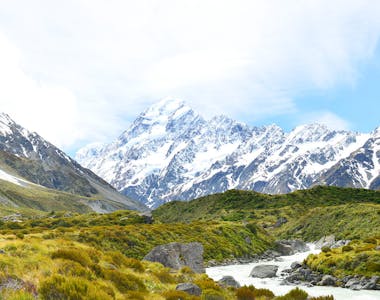
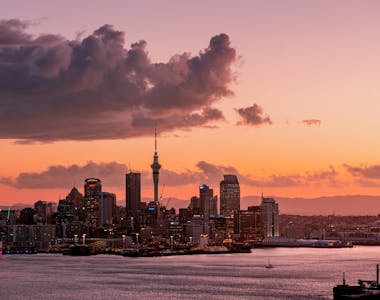
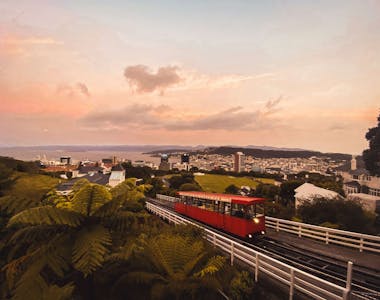
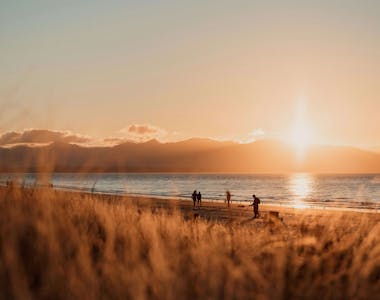
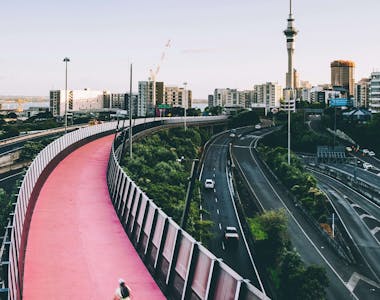
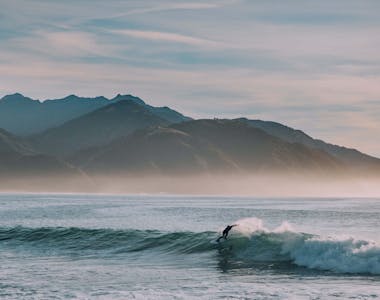
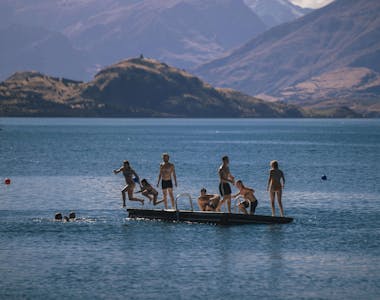
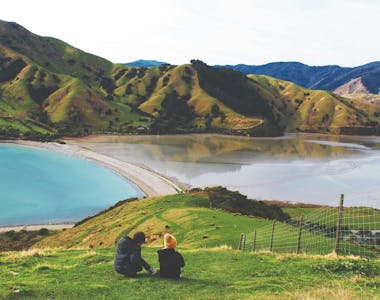
Book With Confidence
Monthly Payments
Spread the costs with no interest or additional fees
Best Price Guarantee
We won't be beaten on price. If you find this adventure at a lower price please get in touch!
Reserve now & pay later
Reserve your adventure today and pay later, free of charge
ATOL protected
Book with confidence
Hold your space today, for free
or book your trip with a deposit and then pay the rest in instalments.
Reserve your flights with us
Add flights to your booking and we'll take care of the rest. You'll get 24/7 support from our team & ATOL protection.
Speak to our experts
Call or email our expert team to find out more and help with ideas and planning.

